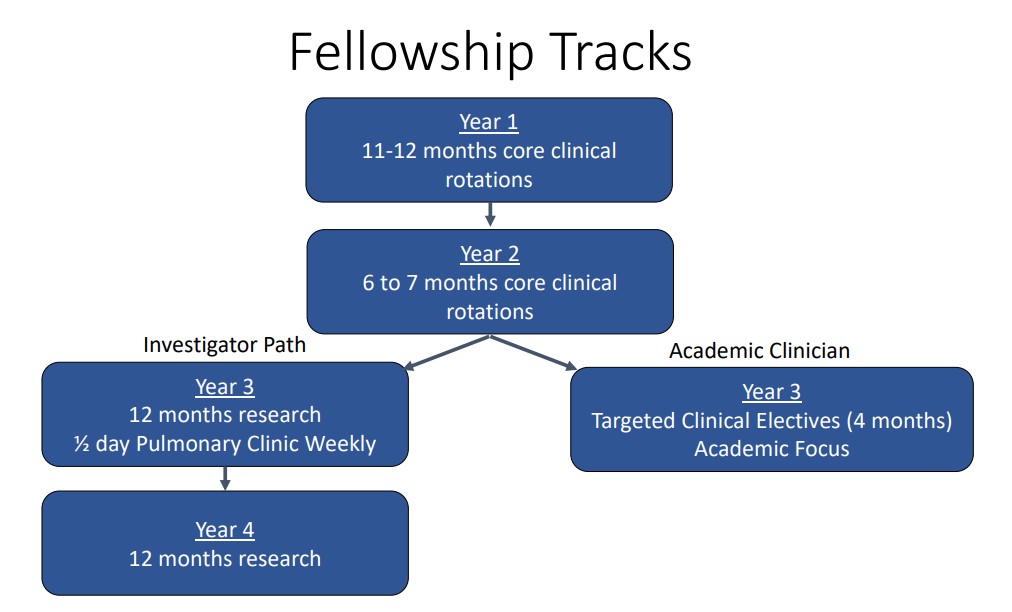Our combined Pulmonary Diseases and Critical Care Medicine fellowship program offers two tracks:
-
Academic Clinician Track – Duke PCCM (NRMP Program Code: 1529156F0)
The Academic Clinician Track is designed to support our trainees pursuing a clinically oriented career in an academic setting. The track offers exceptional clinical training and opportunities to build an area of clinical expertise while also leveraging robust career development opportunities and significant protected time to support scholarly work. This track is ideal for the majority of future PCCM physicians who will primarily support their faculty salaries via clinical effort and health system leadership positions, rather than external research funding. In addition to clinical training, graduates of this track build expertise in an area of academic focus such as (but not limited to) medical education, clinical research, QI/process improvement. The program is designed to help fellows build a strong clinical foundation as mentoring committees are assembled and academic plans mature. The first year of fellowship training is composed of 12 months of core clinical rotations. The second year of training includes six months of core clinical rotations and 5-6 months of protected academic time for all fellows -
Physician Investigator Track – Duke PCCM (NRMP Program Code: 1529156F1)
The Physician Investigator Track is designed to support our trainees pursuing a career as an independent investigator. The track offers a foundation of exceptional clinical training, while prioritizing protected time to build a research program. This track is ideal for trainees pursuing a career as an investigator where the majority of their effort will ultimately be supported by external research funding. The track is primarily supported by the division’s T32 training grant. If aligned with development goals, graduates of the investigator track may complete an additional (4th) year of advanced research fellowship supported by the T32 as they prepare applications for career development funding. The track leverages outstanding mentorship and many robust internal career development support mechanisms to prepare graduates for successful faculty transitions.
Additional Information
Between these two tracks, our program accepts a total of five fellows annually. We believe a strong clinical foundation is essential for our fellows' success. Accordingly, fellows in both tracks complete core clinical rotations during the first 2 years of fellowship as mentorship committees and academic plans mature. The structure of our tracks primarily diverge in the 3rd year of fellowship.
Fellowship Track Frequently Asked Questions (FAQs)
We believe a strong clinical foundation is essential for success and leadership in any area of academic pulmonary and critical care medicine. Accordingly, fellows in both our Physician Investigator and Academic Clinician tracks have a similar core clinical training experience that fulfills American Board of Internal Medicine requirements certification eligibility in both pulmonary diseases and critical care medicine. Our core clinical training prioritizes clinical rigor, leadership opportunity, and the graduated autonomy necessary to prepare each of our trainees for independent practice in any setting. The clinical training experience typically diverges in the 3rd year of fellowship. Physician Investigator Track fellows have a pulmonary continuity clinic ½ day weekly but otherwise typically dedicate their effort exclusively towards research. Academic Clinician Track fellows will complete at least 4 months of clinical electives designed to build an area of clinical expertise. Clinical training may also be supplemented by longitudinal subspecialty clinic experiences within a particular disease/area of focus. Fellows in the Academic Clinician Track also have ½ day of continuity clinic weekly in their 3rd year of fellowship.
An additional year of advanced research training supported by the division’s T32 training grant is generally expected and often essential to career development for fellows in the Physician Investigator Track. We recognize 4 years of fellowship may not be optimal for every aspiring investigator. Some may be ready to transition to a junior faculty role after 3 years while others significantly benefit from a 5th year of fellowship. Though 4 years of fellowship is most common, this individualized decision is made in collaboration with each fellow’s mentorship committee. An additional (4th) year of fellowship is not guaranteed for those matching into the Physician Investigator Track but is generally supported for all trainees demonstrating progress in their research plan who have the support of their mentorship committee.
Yes, you may rank both Duke PCCM fellowship tracks!
Career plans naturally evolve over time. We intentionally structure our fellowship program to offer opportunities to explore the full breadth of academic pulmonary and critical care medicine during your core clinical training. This allows more time to build mentorship and experience that will help inform your career decisions. With the support of strong mentorship and a robust career development plan, the program can support career plan changes, including those requiring a change in fellowship tracks.
Feel free to contact us! Generally, the Academic Clinician Track is best for applicants who aren’t sure about their career plans or those who haven’t yet been able to gain significant research experience. We recognize each situation is unique, so we’re happy to discuss this with you.
